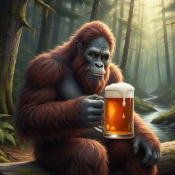@trapper I think you are assuming that Humans will never themselves progress to a cognitive level that would allow for more understanding of the workings of things like our Universe. I mean, I can somewhat agree with your statement regarding "limitations of our present scientific level of advancement and its possible permanence". Somewhat. And what I'm going to say needs to be couched in more or less evolution:
Genes mutate. It's what they do. It was gene mutation that separated hominids from Chimpanzees by creating copies of the NOTCH2NL gene which gave hominids increasing brain size and cognitive powers. It is those very genes that have gotten us scientifically to where we are today, which I think is fairly significant considering what we have accomplished technologically. But that isn't the whole story. Again, gees mutate, which means Nature isn't finished with us yet. Sometimes genes mutate through environmental forcing and I think science is part of that forcing dynamic. So. We're not done. This isn't the end of the line for Human brain power. Because the NOTCH2NL brain gene variations that we have may go on to create a situation where we create progenitor cells faster and in more abundance that we do now during fetal development. The ability to create more progenitor cells is what allowed Humans, in turn, to create more neurons.
This increased progenitor cell process that Humans have is how we left the Great Apes way behind in the area of bigger brains and higher cognitive thinking. Having said that, I see no reason for Humans to not get even higher up the ladder in those things where we develop a deeper understanding of the natural world's physics and beyond. Humans have produced geniuses: Archimedes, Galileo, Newton, Einstein, Tesla, Nash, and many others. It may happen that geniuses become the norm. I think we have many more now but most of them get chewed up in the machine and never get an opportunity to reach their potential. Who is to say how far we'll go (or not go) as a species.



